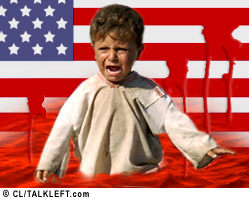Infant Mortality Soars in Iraq

Save the Children and the National Center for Health Statistics have released their latest studies of infant mortality rates around the world. While the rate in the U.S. remains about the same, the rate in Iraq is soaring:
The U.S. report is here.Two wars and a decade of sanctions have led to a huge rise in the mortality rate among young children in Iraq, leaving statistics that were once the envy of the Arab world now comparable with those of sub-Saharan Africa.
A new report shows that in the years since 1990, Iraq has seen its child mortality rate soar by 125 per cent, the highest increase of any country in the world. Its rate of deaths of children under five now matches that of Mauritania.
| < How About Congress Gives Bush Until April 1 2008? | Fort Dix Attack Suspects Arrested > |



